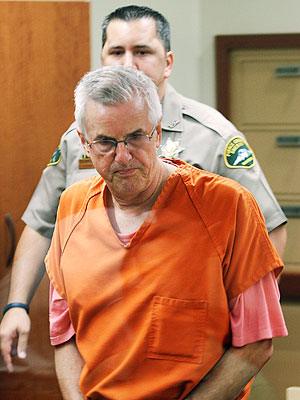Down the narrow corridor that runs through one of California's oldest neighborhoods, behind the perfectly preserved 200-year-old houses, the source of a heated debate in San Juan Capistrano pokes out his leathery neck with a goofy smile.
The city resting at the foot of south Orange County's green-covered hills is known for its tight embrace of a rich history: Hundreds of horses march through the streets each year to welcome the swallows' expected return to the mission; an old-world Spanish motif of stucco walls and terra cotta roofs embraces even burger joints and banks; and on historic Los Rios Street, there are strict rules about what belongs and what doesn't.
And the 40-foot-long acast off by a Romanian shopping mall? A group of neighbors and historical advocates think not, and are fighting a petting zoo to evict the dinosaur statue that has gripped the city's attention for months.
"Never in a million years — or 165 million years — did I think it would turn into such a frenzy," said Carolyn Franks, the owner of Zoomars Petting Zoo, who paid $12,000 for the faux Jurassic creature to join the menagerie of floppy-haired alpacas, rabbits, horses and a couple of zebra-donkey hybrids called zedonks.
"I brought this statue in with the best of intentions," she said, noting that her recent addition of a fossil hunt had been a hit at the zoo and that she'd wanted more prehistoric fare to please her clientele. She got a Tyrannosaurus rex skull first, then found the apatosaurus — now dubbed Juan the Capistrano Dinosaur — sitting in an Anaheim warehouse.
He — or at least they think he's a he — has been at the zoo since June, but his Los Rios Street abode is notably sparse: There's none of the greenery that an herbivore like his ancestors would have munched, and the sandboxes intended for more fossil digging are bare. The placard introducing him to visitors is stamped "Pending City Approval."
Although the city's Cultural Heritage Commission gave Juan a stamp of approval in a close vote, his fate remains anything but determined, with city officials still to weigh in on the matter.
Juan's opponents say he threatens the integrity of a neighborhood listed on the National Register of Historic Places. For starters, they say, he's an eyesore. And considering that the region was probably underwater when dinosaurs roamed the Earth, no a T. rex or other outsized lizard would have come through San Juan Capistrano unless lost at sea. Nor did the foes take too well to Juan's arriving without previous approval or city permits.
(Even Juan's arrival is murky: Critics contend Franks sneaked him in during dark of night. She says he came by truck in half a dozen pieces on a sunny afternoon.)
"You're not putting a merry-go-round in the Vatican or a big slide in the White House," said historian Ilse Byrnes, who worked to have Los Rios added to the national registry. "It's destroying the historical integrity of the area if she gets to keep it."
Jan Siegel, a Cultural Heritage commissioner, said the Los Rios enclave — described by one business owner as "the soul of San Juan" — has been protected as a quaint, mostly residential area by the rules that Franks appears to be flouting. Proposed businesses, such as a wine and beer garden, have been kept out; businesses have to close shop by 5 p.m.; and the number of visitors who stroll the narrow street each year is regulated.
"It's a unique, fragile area, in my opinion, and it needs to be preserved in a special way," Siegel said.
Juan's opponents have no problem with the petting zoo, saying it's an example of the livestock that would have been around centuries ago (except for the zedonks). Once known as the Jones Family Minifarm, it has been on Los Rios for three decades, sitting alongside the Historical Society, a nursery that's been in business since 1970 and the Rios Adobe that dates to the 1790s.
The dinosaur, Siegel said, arrived as a "kind of slap in the face."
But supporters counter that Juan is hardly a neighborhood disturbance and his presence doesn't violate the effort to maintain the surrounding history.
"It's a statue!" said Rhonda deHaan, Cultural Heritage Commission chairwoman. "It can't be more passive than that."
She said the statue is difficult to spot from the street, camouflaged in his green-gray skin, and that trees will be planted to further obscure Juan's long, skinny neck. He's no more of a distraction, she said, than the delivery trucks or cars clogging the street that, in some places, is about as wide as a sidewalk.
On a recent afternoon, Franks, who has owned the site for eight years, stood beside her statuesque acquisition, boasting that he had become almost as much of a draw as the pony rides. She said attendance nearly doubled over the summer, and there was a line of visitors snapping pictures of the friendly faced apatosaurus as she spokeChildren, she said, gravitate to him.
"They make it sound like this Godzilla that's coming to destroy the town," she said of Juan's critics.
Moments later, though, a group of children playing a few feet from the ashrieked in fear. "A dinosaur! A dinosaur!"
Then the bravest of them dashed over in her red cowgirl boots and stared the creature down: "Get out of my town, you beast!"
rick.rojas@latimes.com










